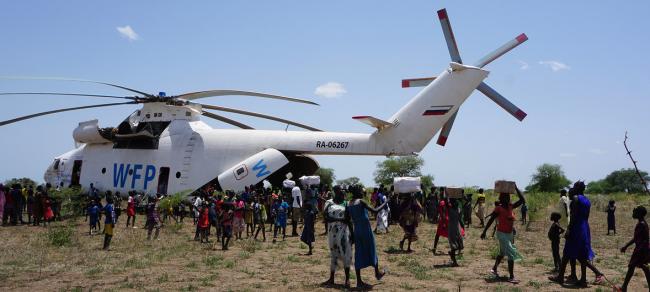
South Sudan’s ‘relentless conflict’ leaves almost 60 per cent suffering desperate food crisis
New York, Sept 29 (IBNS):“Relentless conflict” in South Sudan has now left more than six million people facing crisis levels of hunger, three UN agencies have said, amid ongoing efforts to deliver aid to the war-weary country.
The warning follows the release of a report on Friday, indicating that it is only large-scale humanitarian assistance being provided in many areas of the country, that has prevented even more devastating hunger during the July and August lean season.
“More than six million lives shattered by hunger are just too many,” said Pierre Vauthier, the UN Food and Agriculture (FAO) Acting Representative in South Sudan.
Violence in the country dates back to 2013 when political rivalry saw fighting erupt between army forces, and troops loyal to the Vice-President. It has left South Sudan facing one of the world’s worst humanitarian crises, according to the UN.
According to the latest FAO IPC report (shorthand for Integrated Food Security Phase Classification) on a scale of one to five, 47,000 people face the highest level of hunger in South Sudan (IPC phase 5).This is despite the signing of a peace agreement between the President and his former deputy, earlier this month, and insecurity continues to be an obstacle to aid access.
A further 1.7 million are at an “emergency” level (IPC4), and 6.1 million – nearly 60 per cent of the population – live in a “crisis” state of chronic food shortages (IPC3).
The situation is deemed especially worrying in the former states of Unity, Lakes, Jonglei, Upper Nile and Western Bahr el Ghazal. Conditions are desperate in the counties of Leer and Mayendit in former Unity state, where famine was declared in February last year.
Although famine was ultimately reversed in these famine-hit areas, lack of access has prevented humanitarians from assessing current needs.
In addition to conflict-related displacement, the UN agencies insist that hunger is driven by disruption to livelihoods and markets, lack of access to social services and restricted trade, owing to inaccessible roads during the rainy season.
UN agencies appeal for sustainable peace
Together with the World Food Programme (WFP) and the UN Children’s Fund (UNICEF), FAO is appealing for a sustainable peace across the country, together with unhindered, safe access to all areas where survivors of the fighting have been left with nothing and need life-saving help.
If this can be achieved, IPC forecasts show an improved, though still serious, outlook for the rest of the year and into 2019, the UN agencies said in a statement.
“Assessment after assessment, we find that conflict is the main driver of this desperate situation, making it impossible for farmers to get back on their feet,” Mr Vauthier said. “We are reaching as many people as we can, in almost every county, but it is critical to end conflict and sustain peace to prevent an already severe food insecurity situation from deteriorating even further.”
So far in 2018, WFP has reached more than three million people with 30,000 tons of food and $2.9 million in cash-based transfers.
FAO has supported 1.4 million farmers with agricultural seeds and tools during the main planting season so that they can increase cereal production.
UNICEF and its partners, meanwhile, have admitted more than 147,000 children suffering from severe acute malnutrition into outpatient treatment programmes and stabilization centres.
UNICEF/Peter Martell
Support Our Journalism
We cannot do without you.. your contribution supports unbiased journalism
IBNS is not driven by any ism- not wokeism, not racism, not skewed secularism, not hyper right-wing or left liberal ideals, nor by any hardline religious beliefs or hyper nationalism. We want to serve you good old objective news, as they are. We do not judge or preach. We let people decide for themselves. We only try to present factual and well-sourced news.







